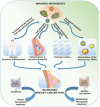Microbial Alterations and Risk Factors of Breast Cancer: Connections and Mechanistic Insights
- PMID: 32354130
- PMCID: PMC7290701
- DOI: 10.3390/cells9051091
Microbial Alterations and Risk Factors of Breast Cancer: Connections and Mechanistic Insights
Abstract
Breast cancer-related mortality remains high worldwide, despite tremendous advances in diagnostics and therapeutics; hence, the quest for better strategies for disease management, as well as the identification of modifiable risk factors, continues. With recent leaps in genomic technologies, microbiota have emerged as major players in most cancers, including breast cancer. Interestingly, microbial alterations have been observed with some of the established risk factors of breast cancer, such as obesity, aging and periodontal disease. Higher levels of estrogen, a risk factor for breast cancer that cross-talks with other risk factors such as alcohol intake, obesity, parity, breastfeeding, early menarche and late menopause, are also modulated by microbial dysbiosis. In this review, we discuss the association between known breast cancer risk factors and altered microbiota. An important question related to microbial dysbiosis and cancer is the underlying mechanisms by which alterations in microbiota can support cancer progression. To this end, we review the involvement of microbial metabolites as effector molecules, the modulation of the metabolism of xenobiotics, the induction of systemic immune modulation, and altered responses to therapy owing to microbial dysbiosis. Given the association of breast cancer risk factors with microbial dysbiosis and the multitude of mechanisms altered by dysbiotic microbiota, an impaired microbiome is, in itself, an important risk factor.
Keywords: aging; breast cancer; estrogen; microbial metabolites; microbiome; microbiota; obesity; periodontal disease; xenobiotics.
Conflict of interest statement
The authors declare no conflict of interest.
Figures



References
-
- Rose U.D., Vetizou M., Roy S., Edwards B., Peck M., Smith L., Robles A., Harris C., Difilippantonio S., Trinchieri G. Role of the Microbiota in Primary Lung Cancer Initiation and Progression. J. Immunol. 2019;202:190–191.
-
- Gomes S., Cavadas B., Ferreira J., Marques P., Monteiro C., Sucena M., Sousa C., Vaz Rodrigues L., Teixeira G., Pinto P., et al. Microbiota profile of Non-small Cell Lung Cancer (NSCLC): The study of a large cohort. ERJ Open Res. 2019;5:PP101.
Publication types
MeSH terms
Substances
Grants and funding
LinkOut - more resources
Full Text Sources
Medical

